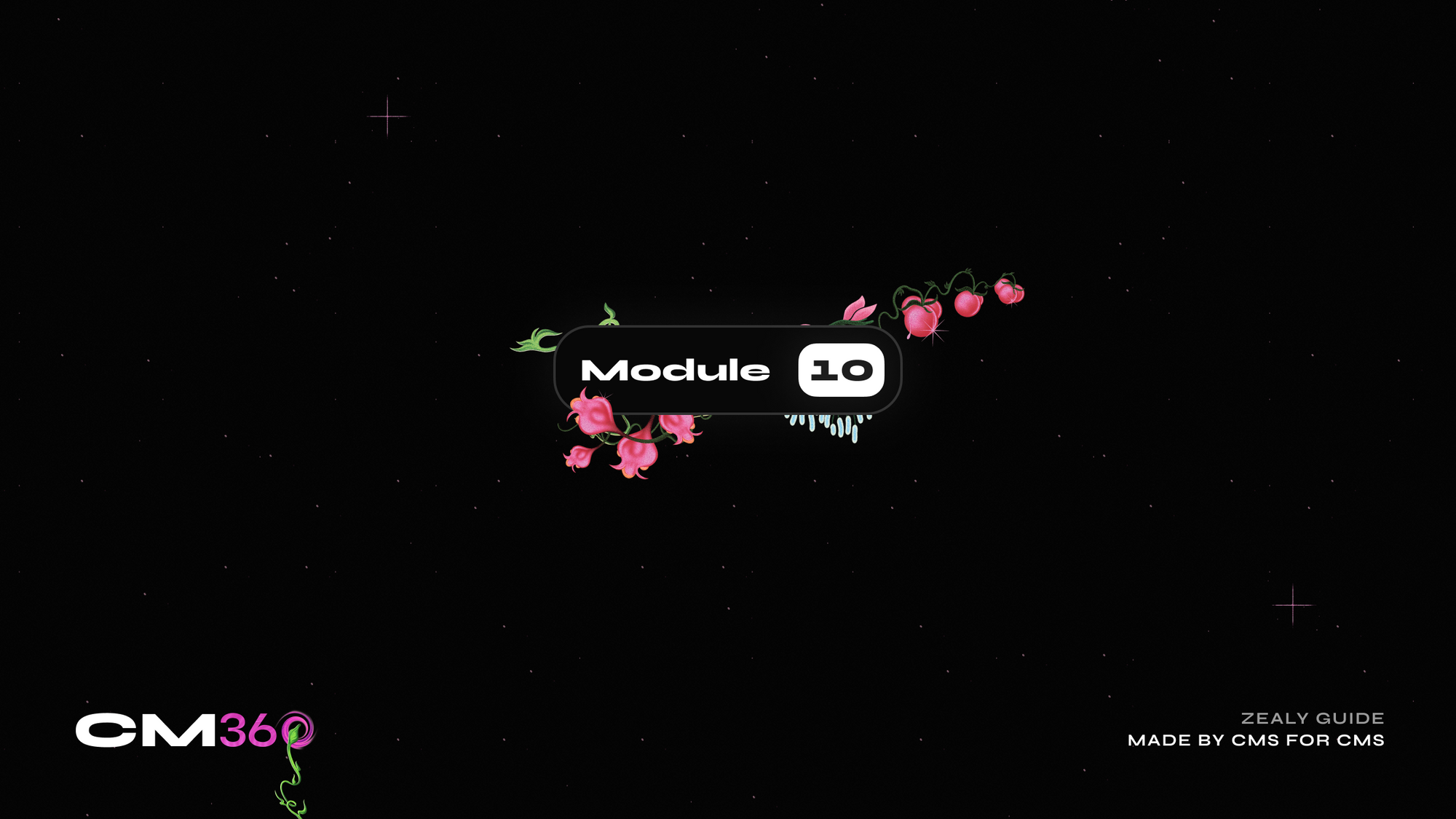Module 10: Talk Like a Web3 Pro - Mastering the Lingo
Knowing the essential terms in the Web3 ecosystem is crucial to participate in this exciting space. Plus, understanding the slang terms commonly used within the community can help you navigate the rapidly evolving Web3 ecosystem.

Congratulations! You made it to end the of the CM360 Course 🎉
In this final module, we will explore some essential terms to get you started or simply refresh a bit your knowledge of the Web3 ecosystem.
Web3
Web3, short for Web 3.0, represents the evolution of the internet towards a decentralized and user-centric paradigm. Unlike the traditional Web 2.0, Web3 leverages blockchain technology, cryptography, and decentralized networks to enable greater user control, privacy, and ownership of digital assets. It empowers individuals to interact directly with applications, transact securely, and participate in decentralized governance.
Blockchain
Blockchain is the foundational technology behind Web3. It is a decentralized and immutable ledger that records transactions across multiple computers or nodes. Each block in the blockchain contains a timestamped batch of transactions, and once added, it becomes a permanent part of the network. Blockchain ensures transparency, security, and trust in Web3 applications.
Wallet
A software application that allows users to store, manage, and transfer cryptocurrency.
Coins
Cryptocurrencies that have their own standalone independent blockchain (Bitcoin, Ethereum, XRP, etc.).
Altcoins
Coins that are not Bitcoin.
Tokens
Cryptocurrencies that do not have their own blockchain but live on another blockchain. They benefit from the technology of the blockchain they reside on (i.e., ERC-20 tokens).
Exchange platform
A platform where you can buy and sell cryptocurrencies.
NFTs (Non-Fungible Tokens)
NFTs are unique digital assets that represent ownership or proof of authenticity of a specific item, artwork, collectible, or virtual property. Unlike cryptocurrencies, which are fungible and interchangeable, each NFT possesses distinct characteristics and cannot be replicated. NFTs have revolutionized digital ownership and are widely used in digital art, gaming, and virtual worlds within the Web3 ecosystem.
Minting
Minting is the creation of new tokens or NFTs on a blockchain, involving the generation of unique digital assets through smart contracts.
Gas Fees
Gas fees are the transaction fees paid in cryptocurrency to process and validate transactions on the blockchain network. In Web3, gas fees are essential for maintaining network security, incentivizing miners, and prioritizing transactions based on their fee amount. Gas fees can vary depending on network congestion and the complexity of the transaction being executed.
Royalties
A percentage of the sale price of an NFT is paid to the creator each time the NFT is resold.
Tokenization
The process of converting real-world assets into digital tokens that can be traded on a blockchain.
DeFi (Decentralized Finance)
DeFi refers to a category of financial applications built on blockchain that aims to democratize and decentralize traditional financial services. DeFi protocols enable users to lend, borrow, trade, and earn interest on their crypto assets, all without intermediaries or central authorities. DeFi has unlocked new opportunities for financial inclusion, transparency, and innovation.
DAO (Decentralized Autonomous Organization)
A DAO is a revolutionary concept in Web3, where decision-making and governance are decentralized. It is an organization governed by smart contracts, enabling stakeholders to participate in the decision-making process and shape the direction of the organization. DAOs promote transparency, autonomy, and community-driven collaboration.
Smart Contracts
Smart contracts are self-executing agreements with predefined rules encoded on the blockchain. These contracts automatically execute when specified conditions are met. They eliminate the need for intermediaries, enhance efficiency, and enable trustless interactions between parties. Smart contracts power various decentralized applications (dApps) within the Web3 ecosystem.
Mempool
In the Web3 ecosystem, the mempool refers to a node's pool of unconfirmed transactions. Think of it as a waiting area where transactions queue up before being added to a block and confirmed by miners. The mempool plays a crucial role in ensuring the smooth flow of transactions within the blockchain network.
Interoperability
Interoperability refers to the ability of different blockchain networks and protocols to seamlessly communicate and interact with each other. It enables the transfer of assets, data, and functionalities across various platforms within the Web3 ecosystem. Interoperability enhances the flexibility and scalability of blockchain applications, fostering collaboration and innovation.
DApps (Decentralized Applications)
DApps are applications that run on decentralized networks, leveraging blockchain technology and smart contracts. These applications offer enhanced
Virtual Real Estate
Digital land or virtual space is represented as NFTs, providing ownership rights and opportunities for development within virtual worlds or metaverses.
Gamification
The integration of game-like elements, mechanics, and incentives into NFT platforms or applications to enhance user engagement and participation.
NFT Wallet Aggregator
A tool or platform that allows users to manage and access multiple NFT wallets from different blockchain networks within a single interface, simplifying asset management.
Peer-to-Peer (P2P)
Peer-to-peer refers to a decentralized communication model where participants interact directly with each other without intermediaries. In Web3, P2P networks facilitate direct and secure data exchange between users, eliminating the need for centralized servers or authorities.
Nodes
Nodes are computers or devices that participate in a blockchain network, maintaining a copy of the blockchain and validating transactions to ensure the network's security and decentralization.
RPC (Remote Procedure Call)
RPC is a communication protocol that allows programs to request and execute functions on remote devices over a network, commonly used to interact with blockchain networks programmatically.
Metaverse
The metaverse refers to a virtual universe where users can interact with each other and the environment in a fully immersive digital world.
Mining
Mining is the process of validating and adding new transactions to a blockchain, typically involving solving complex mathematical puzzles to secure the network and earn rewards.
Protocol
A protocol is a set of rules and standards that govern the operation and behaviour of a blockchain network, ensuring interoperability and consensus among participants.
Fiat
Fiat refers to a government-issued currency that is not backed by a physical commodity, widely accepted as a medium of exchange in traditional economies.
Private Key
A private key is a secret cryptographic key used to decrypt data or sign messages, kept confidential and known only to the owner.
Transaction
A transaction is the transfer of digital assets or information between parties, recorded on the blockchain as a block to ensure transparency and immutability.
How to talk like a Web3 pro: A Slang Compilation
- GM: Short for "Good Morning," GM is a common abbreviation used in online communities and chats to greet others at the start of the day.
- Frens: Derived from "friends," frens is a term used to refer to the supportive and close-knit community within the Web3 space.
- HODL: A misspelling of "hold," HODL is a term used to encourage long-term holding of cryptocurrencies instead of selling during market fluctuations.
- Buidl: A misspelling of "build", is a term used by projects when they are in development.
- DYOR: An acronym for "Do Your Own Research," DYOR encourages individuals to conduct thorough research and due diligence before investing in a cryptocurrency or token.
- To the Moon: Refers to a cryptocurrency or token experiencing significant price growth, often used to describe a rapid increase in value.
- FUD: Short for "Fear, Uncertainty, and Doubt," FUD refers to spreading negative or misleading information about a cryptocurrency to create panic or doubt among investors.
- FOMO: Stands for "Fear Of Missing Out," FOMO describes the feeling of anxiety or urgency to invest in a cryptocurrency or token due to the fear of missing out on potential gains.
- WAGMI: Stands for "We are all going to make it".
- DCA: Stands for "Dollar-Cost Averaging." It is an investment strategy where an individual invests a fixed amount of money at regular intervals, regardless of the asset's price, to reduce the impact of market volatility.
- Shitcoin: Commonly used to describe a cryptocurrency with no real value or potential, often associated with scams or low-quality projects.
- ATH: Stands for "All-Time High." It refers to the highest price level that a particular cryptocurrency or asset has ever reached.
- Whale: A whale is an individual or entity that holds a significant amount of a cryptocurrency, capable of influencing the market with their large transactions.
- Rug Pull: Refers to a scam tactic where developers abruptly abandon a project or token, taking investors' funds and leaving them with worthless assets.
- DeFi Degens: Enthusiasts and active participants in the decentralized finance (DeFi) ecosystem, often engaging in high-risk, high-reward strategies and investments.
- Ape: Refers to someone who quickly and enthusiastically invests in a cryptocurrency without conducting extensive research, often driven by FOMO or following popular trends.
- Rekt: Slang for "wrecked," rekt is used to describe significant financial losses or failures in the cryptocurrency market.
- Shill: The act of promoting or endorsing a cryptocurrency or project for personal gain, often without disclosing any conflicts of interest.
- Bag Holder: A bag holder refers to an investor who bought a cryptocurrency at a high price and is now left holding onto it as its value declines.
- Farming: Refers to the process of staking or lending cryptocurrencies in decentralized finance (DeFi) protocols to earn additional tokens or rewards.
- Pump and Dump: A manipulative strategy where a group of individuals artificially inflate the price of a cryptocurrency to attract investors and then sell their holdings at the peak, causing the price to crash.
- Bagging: Refers to accumulating a particular cryptocurrency or token over time, to hold onto it for long-term gains.
Keep Learning! Look at the full CM360 course here and join the conversation on Discord to start building your network in the Web3 space today.


